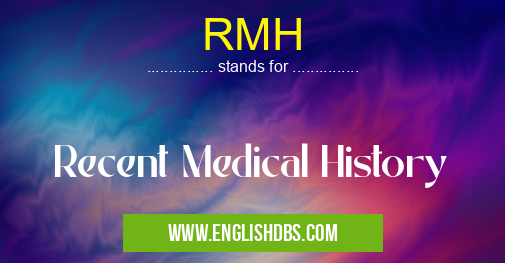What does RMH mean in MEDICAL
Abbreviations are commonly used in the medical field to reduce the space occupied or time taken for writing patient information. RMH stands for Recent Medical History which is a comprehensive summary of the medical events that have happened with an individual recently, prior to their visit in a hospital or clinic. The purpose of tracking patient-related medical records is to maintain continuity of care, provide adequate treatment and monitor progress.

RMH meaning in Medical in Medical
RMH mostly used in an acronym Medical in Category Medical that means Recent Medical History
Shorthand: RMH,
Full Form: Recent Medical History
For more information of "Recent Medical History", see the section below.
Background
Recent Medical History (RMH) is a term which gives healthcare providers a concise overview on the previous medical events experienced by a patient before presenting to the healthcare centre or doctor’s office for consultation. It also helps identify any changes as well as underlying health conditions for accurate assessment and diagnosis. RMH documents include information about previous diagnoses, medications being taken, allergies, immunizations and other relevant details collected from the patients’ past visits or searches in past medical records. This helps categorize what conditions need more attention compared to those that are relatively stable.
What Information is Inclu ded
RMH includes personal information such as age of onset, duration of symptoms, family history and current disease state among other vital milestones related to diseases and treatments received over time. It also includes significant health events like surgeries undergone, tests conducted such as X-rays/MRI/CT scans performed and results obtained from them along with diagnostic conclusions made by treating physicians at earlier stages which will help inform decisions made during current visits. Additionally any notes taken on detailed conversations between doctors and patients are also included in RMH documents. Such conversations discuss aspects like lifestyle choices such as diet & exercise regimen, habits like smoking and alcohol drinking among others.
Purpose
The primary aim of collecting all this information is so that it can be used when making informed decisions about further treatment plans; such datasets offer potential pathologies that could be linked together based on risk factors identified from these records assisting in making presumptive diagnoses faster than traditional methods allow for without compromising accuracy levels`. It can help point out trends in conditions or test results which could give clues into how quickly certain diseases progress over time among other useful insights clinicians can use to improve their practice techniques where applicable. It also ensures that repeated tests do not need to take place unnecessarily since all results have already been captured previously resulting in cost savings as well as more efficient ways of managing individuals' overall health better than before
Essential Questions and Answers on Recent Medical History in "MEDICAL»MEDICAL"
What are the common risk factors for heart disease?
Being overweight, smoking, having diabetes or high blood pressure, and having a family history of heart disease are all risk factors for developing heart disease. Taking steps to reduce these risk factors can help reduce the chance of developing heart problems in the future.
What signs indicate I may have an irregular heartbeat?
Common signs of an irregular heartbeat include feeling dizzy or lightheaded, shortness of breath, chest pain or discomfort, fatigue, palpitations (the sensation of fluttering in the chest) and fainting. If you experience any of these signs, see your doctor right away.
What tests will my doctor do to diagnose heart problems?
Your doctor may do tests such as an electrocardiogram (EKG) to measure your heart's electrical activity and diagnose any abnormal rhythms. Other tests commonly used to diagnose cardiac problems include echocardiograms (ultrasound images of the heart), stress testing and Holter monitoring (which records your EKG for 24-hours).
Is there anything I can do to reduce my chances of a heart attack?
Yes! Some lifestyle modifications have been shown to reduce your risk for a heart attack. These include exercising regularly, eating a healthy diet rich in fruits and vegetables, avoiding cigarettes and other tobacco products, managing stress levels effectively and working closely with your healthcare provider to keep your cholesterol levels under control.
Should I take aspirin if I'm at risk for a heart attack?
In some cases doctors may recommend that patients at risk for a heart attack take daily low dose aspirin therapy. Aspirin has antiplatelet properties which can help prevent blood clots by making it harder for platelets to stick together and form clots that block blood flow in the arteries. However, this should not be done without first consulting with your healthcare provider as there may be contraindications depending on other medical conditions you may have.
Are high cholesterol levels always dangerous?
High cholesterol levels can increase the risk of developing cardiovascular disease when left untreated. But there are many effective treatments available today which can help lower cholesterol levels back into a healthy range safely and effectively. Speak with your healthcare provider about what treatment plan is best for you if you have elevated cholesterol levels.
Is hypertension always serious?
Having high blood pressure puts additional strain on your cardiovascular system which increases the likelihood of complications such as stroke or coronary artery disease over time if left untreated. Fortunately there are several medications available today which can help lower and manage high blood pressure so consulting with your physician is key in deciding on the best course of action.
Are there natural remedies I should try before taking medication?
In some cases mild hypertension can be managed through lifestyle changes such as reducing salt intake, exercising regularly, reducing stress levels and eating a well-rounded diet full of fruits and vegetables rather than relying solely on medication right away; however it is important consult with your physician before starting any new health regimen or supplement routine as certain natural remedies may interfere with other treatments you’re currently taking.
RMH also stands for: |
|
| All stands for RMH |
